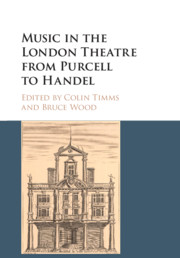Book contents
- Frontmatter
- Contents
- List of Figures
- List of Music Examples
- Notes on Contributors
- Preface
- Introduction
- I FROM PURCELL TO HANDEL
- II HANDEL AND ITALIAN OPERA
- III HANDEL AND ENGLISH WORKS IN THE THEATRE
- 10 Seventeenth-Century Literary Classics as Eighteenth-Century Libretto Sources: Congreve, Dryden and Milton in the 1730s and 1740s
- 11 ‘In this Ballance seek a Character’: The Role of ‘Il Moderato’ in L'Allegro, il Penseroso ed il Moderato
- 12 ‘Straight mine eye hath caught new pleasures’: Glancing and Gazing Spectatorship in Handel's L'Allegro, il Penseroso ed il Moderato
- 13 Accompanied Recitative and Characterisation in Handel's Oratorios
- 14 Handel, Charles Jennens and the Advent of Scriptural Oratorio
- Bibliography
- Index
10 - Seventeenth-Century Literary Classics as Eighteenth-Century Libretto Sources: Congreve, Dryden and Milton in the 1730s and 1740s
from III - HANDEL AND ENGLISH WORKS IN THE THEATRE
Published online by Cambridge University Press: 10 June 2017
- Frontmatter
- Contents
- List of Figures
- List of Music Examples
- Notes on Contributors
- Preface
- Introduction
- I FROM PURCELL TO HANDEL
- II HANDEL AND ITALIAN OPERA
- III HANDEL AND ENGLISH WORKS IN THE THEATRE
- 10 Seventeenth-Century Literary Classics as Eighteenth-Century Libretto Sources: Congreve, Dryden and Milton in the 1730s and 1740s
- 11 ‘In this Ballance seek a Character’: The Role of ‘Il Moderato’ in L'Allegro, il Penseroso ed il Moderato
- 12 ‘Straight mine eye hath caught new pleasures’: Glancing and Gazing Spectatorship in Handel's L'Allegro, il Penseroso ed il Moderato
- 13 Accompanied Recitative and Characterisation in Handel's Oratorios
- 14 Handel, Charles Jennens and the Advent of Scriptural Oratorio
- Bibliography
- Index
Summary
Between 1736 and 1746 in London there was a marked interest in ode, oratorio and masque subjects based on texts by three English poets – William Congreve (1670–1729), John Dryden (1631–1700) and John Milton (1608–1674) – who had worked primarily in the seventeenth century. By the 1730s their reputation through republication, praise and criticism had reached such a level that their works could be described as modern literary classics and frequently acted as an example of the finest English poetical styles for modern authors. At the same time the works of Henry Purcell, some of which are settings of texts by Dryden and Congreve, were also becoming modern classics in the wake of the growing interest in ‘ancient music’. With the success of Alexander's Feast (1736), to a text by Dryden, Handel began a period of his career in which English literary classics played a crucial role in the development of his English-language works, such as L'Allegro, il Penseroso ed il Moderato (Milton), Samson (Milton) and Semele (Congreve), as well contributing to his growing position as a national composer. Handel's contemporaries followed his example, producing their own works influenced by the tradition of odes to St Cecilia in which Alexander's Feast was rooted, or works that used other seventeenth-century literary classics as the basis of their librettos, including, for example, Michael Christian Festing's A Song on May Morning (Milton), Thomas Augustine Arne's The Judgment of Paris (Congreve) and William Boyce's The Secular Masque (Dryden). Through a reassessment of the literary traditions that influenced Handel and his contemporaries in the 1730s and 40s, the development of English-language works following Alexander's Feast can be re-evaluated and placed in a wider literary context.
Congreve, Dryden and Milton in the Early Eighteenth Century
The writings of Congreve, Dryden and Milton, like those of William Shakespeare and Edmund Spenser, had never been forgotten but were still well known in literary circles during the early eighteenth century. Milton, the earliest of the three poets, was especially well-remembered after his death in 1674, owing to the popularity of Paradise Lost (1667).
- Type
- Chapter
- Information
- Music in the London Theatre from Purcell to Handel , pp. 157 - 174Publisher: Cambridge University PressPrint publication year: 2017

